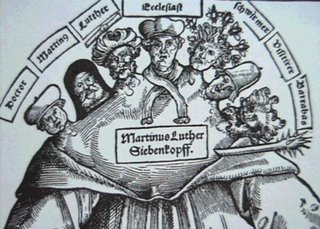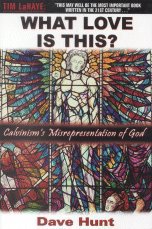[If I recall, this quiz came from the White Horse Inn website]
Both this quiz and the previous one are excellent for Sunday School classes or Bible studies. I've given both these quizzes to a few Sunday School classes.
If you're a trouble maker- give both these quizzes to an
adult Sunday School class. They should know the answers. If they do not, and they've been Christians over 10 years, suggest they should fall under church discipline. If you're
really a trouble maker- give these quizzes to a
high school sunday school class, and let them take it home for each child to test their parents. If you're really really really a trouble maker, give these quizzes to your
senior pastor. If you would like to be asked to leave your church, give both these quizzes to your
board of elders or deacons- and if they get more than half of the questions wrong on each quiz, ask them when they are going to step down from being an elder or deacon.
This one is a little tougher. Have fun. Thanks again to the White Horse Inn gang.
ALL Questions are
TRUE or
FALSE
Church History Quiz
1. Emperor Constantine launched one of the most ruthless campaigns to uproot Christianity
2. The Gnostics were an ancient sect that emphasized the physical over the spiritual
3. Pelagianism was condemned by more church councils than any other heresy in church history
4. Pelagius taught that St. Augustine's doctrine of grace would lead inevitably to moral apathy
5. Arianism was the belief that Christ only appeared to have a human body
6. Orthodox Christians deny the title "Mother of God" as being applicable to Mary, the mother of Jesus
7. The Middle Ages were fairly calm in terms of heresy, due to the strength of Christendom
8. Martin Luther was the first reformer to attack the popularity of Pelagian works-righteousness in the church
9. Jerome Savonarola, in the 15th c., brought morality back to Florence and was, therefore, a precursor to the Reformation itself
10. Erasmus, a Renaissance humanist, was a major obstacle in Luther's breakthrough to understanding the Gospel
11. Martin Luther's great discovery was that the only way a sinner is acceptable to God is if the grace of God alone, by the power of the Holy Spirit, transforms the sinner into a godly Christian
12. The Reformers discovered that God doesn't expect us to be perfect, but that he forgives and accepts us on the basis of our love for him even though we still sin
13. John Calvin believed that the Old Testament law should govern modern nations and that is why he had a little girl stoned to death and had Servetus burned at the stake
14. Luther and Calvin believed that the main purpose of Holy Communion is to remember what Christ did for us and to commit ourselves anew to serving him
15. The Anabaptists were a group of English missionaries who helped advance the Reformation
16. At the Council of Trent Rome anathematized the Gospel
17. The Puritans were a group of English Arminians who sought to bring in the kingdom of God by prohibiting alcohol and banning the theater
18. Calvinists are the only Protestants who believe in unconditional election--that is, the doctrine that God elected sinners to be saved before the creation of the world apart from anything on their part, including foreseen faith
19. The position of the Roman Catholic Church and Arminianism is identical on the main questions of justification and sanctification
20. Pietism was a movement of mainly German and Dutch Protestants who wanted to emphasize the heart over doctrine
21. Modern liberalism arose out of a desire to emphasize Christianity as an intellectual philosophical system rather than a way of life and personal relationship with Christ
system rather than a way of life and personal relationship with Christ
22. The doctrine of conversion and the experience of being born again is central to historic evangelical Christianity
23. The most dominant view of end-times throughout church history has been the Rapture of the church prior to the Tribulation and the personal return of Christ to establish his millennial reign on the earth
**************
Answers to The Church History Quiz
1. FALSE - Galerius was the last of the persecutors and when he died in 311, Constantine launched the building of "Christendom"
2. FALSE - Just the opposite, they taught that matter is evil and spirit is good
3. TRUE
4. TRUE - Pelagius denied original sin and believed that all one needed to do to be saved was to follow Christ instead of Satan
5. FALSE - That's Docetism, an offshoot of Gnosticism; Arianism held just the opposite: Christ was merely a man, not the God-Man
6. FALSE - The Church insisted that the child Mary carried in her womb was no less than God himself. Thus, the title was calculated to defend the divinity of Christ. If she was not the mother of God, of whom was she the mother? Jesus. But was Jesus not God? They did not infer any notion of her being the mother of Christ according to his deity, of course, but those [like Nestorius] who wished to separate Christ's divine and human nature were warned against this by the title
7. FALSE - The period saw the rise of scores of sects, heresies, and schisms especially in the West
8. FALSE - Thomas Bradwardine, 14th c. archbishop of Canterbury; Johann von Staupitz, Luther's mentor, and the Waldensians, Wycliffe--14th c., Hus--15th c., were opponents of what Bradwardine referred to as "the new Pelagians"
9. FALSE - The Reformation was a recovery of the Gospel, not a moral crusade
10. FALSE - It is said that he "laid the egg that Luther hatched," by recovering the meaning of the key Greek words for "justification," "repentance," from the perversions of the Latin Vulgate
11. FALSE - Rome said that justification was due entirely to God's grace transforming the believer, while the Reformers insisted that justification, unlike sanctification, was a legal declaration, not a spiritual or moral transformation, even though the latter always follows
12. FALSE - They knew that God demanded perfect righteousness, and that's why justification is a perfect righteousness imputed rather than an infused righteousness or ability to pursue righteousness
13. FALSE - Calvin never had a girl stoned and actually pleaded with the city officials not to burn Servetus. He did not believe that O.T. civil law is applicable to modern nations, as he states in the Institutes
14. FALSE - Although they held different views, both believed in the "Real Presence" of Christ in Communion and denied that it was a mere memorial
15. FALSE - They formed the "Radical Reformation," believing that Protestants [Lutherans and Reformed] didn't go far enough in condemning Romanism [viz., infant baptism, the creeds, etc.] and that they denied that the Spirit is above and speaks apart from the Word. Many Anabaptists taught unorthodox doctrines, including Menno Simons' denial of Christ's true humanity, and embraced works-righteousness
16. TRUE - The Council of Trent of the Roman Catholic Church officially condemned the doctrine of justification by faith alone and its related teachings. Here are some of the most famous lines:
Canon 9: If anyone says that the sinner is justified by faith alone..., let him be anathema
Canon 11: If anyone says that men are justified either by the sole imputation of the justice of Christ or by the sole remission of sins,... let him be anathema
Canon 12: If anyone says that justifying faith is nothing else than confidence in divine mercy, which remits sins for Christ's sake, or that it is this confidence alone that justifies us, let him be anathema
Canon 24: If anyone says that the justice received is not preserved and also not increased before God through good works but that those works are merely the fruits and signs of justification obtained, but not the cause of the increase, let him be anathema
Canon 30: If anyone says that after the reception of the grace of justification the guilt is so remitted and the debt of eternal punishment so blotted out to every repentant sinner, that no debt of temporal punishment remains to be discharged either in this world or in purgatory before the gates of heaven can be opened, let him be anathema
Canon 32: If anyone says that the good works of the one justified are in such manner the gifts of God that they are not also the good merits of him justified; or that the one justified by the good works that he performs by the grace of God and the merit of Jesus Christ... does not truly merit an increase of grace and eternal life... let him be anathemaThe above continues to be the official doctrine of the Roman Catholic Church to this very day
17. FALSE - They were English Calvinists who wanted to purify worship from what they believed to be persistent superstitions. Against their popular image, they actually were at the forefront of worldly affairs, including the arts, literature, science, exploration, and politics. See Joseph Butler's Theatre and the Crisis (Cambridge) and Leland Ryken's The Worldly Saints (Zondervan), for starters
18. FALSE - Unconditional election is the classical position of both the Roman Catholic and the major Protestant communions that came directly out of the Reformation
19. TRUE - Arminians traditionally deny the Protestant formula of justification [i.e., "justification by grace alone through faith alone because of Christ alone"] and argue that faith itself is the ground [rather than instrument] of justification. Further, they see justification as a process of being conformed to Christ
20. TRUE - Originally, they simply wanted to recover the union of doctrine and life, but the movement ended up creating anti-intellectualism, legalism and a cynical view of the institutional church
21. FALSE - Actually, its source was pietism and the desire to locate religion in a "spiritual" realm that would be safe from what the assault of the critics. Even though Christ may not have been raised in real human history, "he lives within my heart."
22. FALSE - Historic Protestantism focuses on the objective work of Christ for sinners rather than on the subjective work of Christ within sinners, while affirming and defending both
23. FALSE - The Dispensational scheme, including the idea of the Rapture, arose in the nineteenth century for the first time















